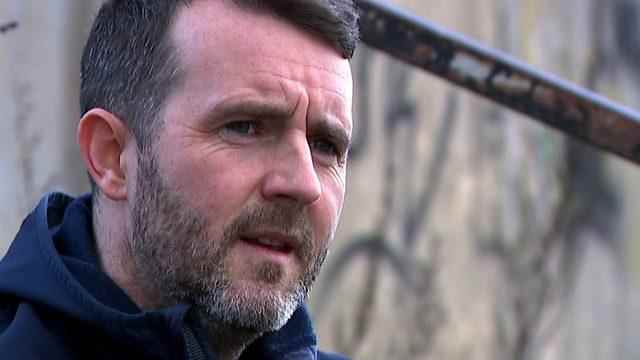According to research by the BBC Scotland Department, one in 10 fathers suffers from depression within the year after having a baby, but there is no specific method for monitoring the mental health of new fathers.
Peter Divers, 39, said he suffered from depression after his second child was born in November 2016, but hid his feelings for months.
“It was the darkest period of my life,” he says.
A back injury the day after his son was born made it even harder for Peter to deal with depression.
“Every morning I would wake up with a knot in my stomach. I had the feeling that there was a big dark cloud watching over me,” she says.
Peter, who lives in Glasgow, has been unable to tell anyone, including his wife, how he feels for five months.
He also hesitated to see his family doctor. But one day, when she went to her mother to pick up her eldest daughter, she could not stand it anymore and started to cry.
“I cried on my mom’s shoulder for 15 minutes,” she says.
“I said a lot of things about my feelings, I poured my heart out, it was good to share with someone,” she adds.
‘**Men don’t talk much about their feelings**’
Selena Gleadow-Ware, a psychiatrist at the Royal College of Psychiatry in Scotland, says studies have shown that between 8 and 10 percent of men experience depression after their partner gives birth.
Dr. “Men don’t talk much about their feelings, they’re afraid to share their feelings, so most of the time the problem goes unnoticed or hidden,” says Selena Gleadow-Ware.
Dr. According to Gleadow-Ware, there are many factors that trigger depression after baby birth.
For the mother, this can be physiological or hormonal changes.
The changes brought about by being a new parent, relationship stress, worries about financial situation or insomnia can trigger depression in both men and women.
According to England’s National Health Service NHS, those with mental health problems, past trauma, lack of support and those with a partner with depression are more likely to have postpartum depression.
Keith Lonsdale’s wife, Alice, was hospitalized for depression treatment after the birth of both of their daughters. The second time, his wife Keith also suffered from depression.
He says he’s trying to deal with the situation and come to the aid of anyone who needs him.
Keith eventually quit his job out of stress and anxiety.
Support groups have emerged in Scotland in recent years, where men can meet and talk about their mental health.
Fathers Network Scotland, which aims to protect the physical, mental and emotional health of men, requires all men whose spouses are pregnant to be screened for postpartum depression.
Kevin Stewart, the minister for mental health in the regional Scottish government, said that what fathers need after the birth of a baby is being investigated.
